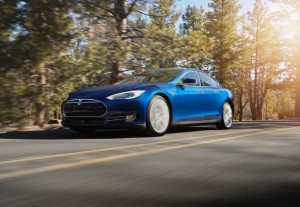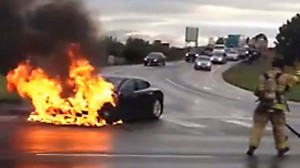
Tesla denies that there is any problems with the suspension on the Model S after one owner claimed to lose control of the car after the ball joint failed.
Federal safety regulators are looking into reports of a potential problem with the suspension system used on Tesla’s Model S sedan.
A spokesman for the National Highway Traffic Safety Administration confirmed the agency is reviewing problems that could cause a driver to unexpectedly lose control of the vehicle. Tesla officials deny there is any problem with the suspension in the Model S or the Model X.
The company noted that on April 20, NHTSA asked Tesla for information about its suspensions as part of “routine screening.”
“On April 30th, we provided all relevant information to NHTSA. NHTSA has since told us that we have cooperated fully and that no further information is needed,” the company reported in a blog posted overnight. “Neither before nor after this information was provided has NHTSA identified any safety issue with Tesla’s suspensions.”
The news comes as another potential blow to a company that has already been hit by reports of serious quality and reliability problems. A variety of problems have been reported about both the Model S sedan, as well as the newer Model X battery SUV. Tesla CEO Elon Musk has said the maker is attempting to address such issues and recently shook up the company’s manufacturing leadership team.
NHTSA is “examining (a) potential suspension issue on the Tesla Model S,” said NHTSA spokesman Bryan Thomas, that could cause its control arms to break. A driver could lose control if that were to happen.
Tesla contends the problem with the ball joint on this vehicle is an isolated incident. In a blog post, the maker noted the part “experienced very abnormal rust. We haven’t seen this on any other car, suggesting a very unusual use case.”
The car had clocked more than 70,000 miles, according to the company, and the owner lived on a dirt road so long it took Tesla two different tow trucks to get back to the service center. “When we got the car, it was caked in dirt,” the company said.
(Tesla offering new $50K Model S. For more, Click Here.)
The suspension problem is one of a number of issues with the Model S that have been reported on various owner websites and in complaints filed with NHTSA. The agency maintains a website for reporting such issues and requires manufacturers to also weigh in when they record potential safety problems.
Additionally, the agency also warned Tesla that it must drop a “troublesome nondisclosure agreement” that might be taken by Model S owners to mean they cannot report safety issues to federal regulators.
But the NHTSA official said that Tesla’s agreement may lead owners to hold back on that feedback. Pointing to a “troublesome nondisclosure agreement, Thomas said in a statement that, “The agency immediately informed Tesla that any language implying that consumers should not contact the agency regarding safety concerns is unacceptable and NHTSA expects Tesla to eliminate any such language.”
Tesla denied it was forcing owners to sign nondisclosure agreements, calling the charge “preposterous;” however, the company did acknowledge it often has owners sign “Goodwill Agreements” after it performs service actions. The idea behind the agreement is to show that Tesla performed the action voluntarily only to have it used against the company in court. The maker plans to discuss the agreement with NHTSA to see if it can be improved.
“It is deeply ironic that the only customer who apparently believes that this document prevents him from talking to NHTSA is also the same one who talked to NHTSA. If our agreement was meant to prevent that, it obviously wasn’t very good,” the company noted.
(Click Here to see why Tesla is looking to raise $2 billion with a new stock offering.)
If the agency does find there is a problem with the Model S suspension it could trigger one of the rare recalls for the automaker. Tesla previously ordered a handful of official recalls, including one last November for a seat belt issue on the electric sedan. It also took steps to beef up protection for the car’s battery pack after several fires were reported.
But while the sedan has otherwise had a positive safety record – scoring high on both NHTSA crash tests and testing done by the Insurance Institute for Highway Safety – both Models S and X have come under fire for serious quality problems.
After initially calling the battery sedan the best vehicle it had ever tested, influential Consumer Reports magazine subsequently withdraw its “Recommended Buy” rating last summer due to quality concerns. Then, two months ago, it issued new warnings about the Model X, noting, “Tesla message boards are already swelling with complaints from Model X owners.” These covered concerns such as the unusual falcon doors, as well as malfunctioning second-row seats and sheet metal gaps.”
Separately, Tesla owner boards have raised concerns about faulty lithium-ion battery packs. The automaker told TheDetroitBureau.com it did address some issues with early versions of the Model S.
The agreements that Tesla buyers are currently required to sign could create additional problems for Tesla, especially if it turns out owners were underreporting safety concerns. In recent years, NHTSA has fined several automakers, including Honda and BMW, for not adequately reporting known issues to the agency.
(Tesla among brands most bedeviled by software glitches, reports JD Power. Click Here for the story.)
NHTSA uses an early warning database to help address safety issues as quickly as possible and attempt to avoid long delays that allowed such issues as a GM ignition switch defect to go unresolved for a decade, resulting in more than 120 known deaths.
Michael Strong contributed to this report.

